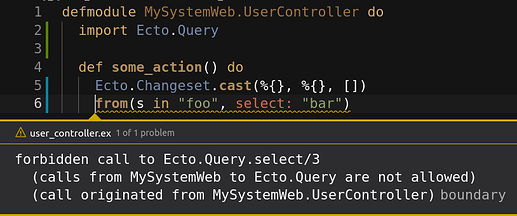@justincjohnson Yup, umbrella allows to have multiple OTP apps in one meta-project with less ceremony (although opinions on that vary :)) than managing multiple projects altogether.
And indeed umbrella’s main concern isn’t validating cross-module deps i.e. what boundaries does - as stated in the official guide umbrella has drawbacks in that department.
What umbrella does that could be perceived as similar to boundaries is that it allows to split app code into higher level buckets compared to modules i.e. OTP apps and that it draws dependencies between those apps via deps with in_umbrella BUT it’s a very unreliable tool for guarding these dependencies because if app A always declares dependency on app B and app B doesn’t declare dependency on app A, it still can call code of app A without warnings because these apps are always present together in the build.
Therefore I rather see umbrella as tool for exactly what you wrote i.e. creating heterogenic releases made of different sets of OTP apps, than a code organization tool.























